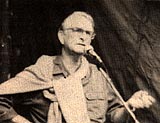Len Webb's support of and involvement in the Terania
protest was of great importance. A respected academic and scientist, Len's
comments are still of vital relevance today. The following interview was
conducted for the "Message of Terania" magazine. |
 |
The Unsung Prophet |
Dr. Len Webb is the CSIRO's outspoken senior rainforest
scientist. His involvement in the Terania Creek effort started with his
first study in the area 27 years ago.
His qualifications and experience rank him as the most expert voice in his
field. But he says the unconsciousness of Australia is such that he is listened
to more attentively and more often outside his own country. This attitude
has produced a love/hate relationship between the intense, greying man and
his country. This interview with Dr. Webb was recorded at Terania Creek. |
Question: Dr. Webb, you're the most qualified advisor on rainforests
in Australia, yet in the past governments have ignored your most urgent
advice. What does this do to you?
Dr. Webb: I was a member of the Committee of Inquiry into the National
Estate. We put out a report in 1974 and we really sweated blood over it.
It took us a couple ot years to prepare and there were hundreds of submissions
from a very wide cross-section of the community. But nobody took any notice
of us. It 's a bit like being a prophet unsung in his own country. I've
just come back trom two months in South-East Asia and I go there quite a
bit. I'm better known and more attentively listened to there and in other
countries than I am inside Australia. But I certainly don't give up and
I think that Terania Creek is the kind of issue that I feel I must identify
with as a professional ecologist. Part of my doctorate of philosophy work
back in 1952 began here in Whian Whian State Forest. Isn't it ironic that
I'm back here 27 years later, for God's sake, and I'm trying to preserve
the remaining fragments of that forest.
Question: If you were drawing up a ladder of world conservation policies,
where would Australia rate?
Dr. Webb: Before tne early 1960's, Australia distinguished herself
among all nations by knocking hell out of the place so rapidly. Within less
than two centuries, we have transformed the landscape, often without much
success and very often causing disasters such as erosion, weed invasion,
and the spread of pests. One must be careful that one does not totally denigrate
the clearing of trees, but there was something about the Australian pioneer
which I find very hard to believe and understand. It is this feeling of
not belonging. It's the old bonanza cult of getting in for your cut and
going back to the shores of Sydney Harbour or in those days, England. These
days, Australia is just slowly starting to realise we belong to the South-East
Asia region, which is bloody remarkable . We're just slowly starting to
believe. Australia is still a middle class phenomonen. Take this whole,
ugly polarisation that is going on in Lismore between the conservationists
and the loggers. The trade unions, the working people should have been more
in this sort ot thing. I'm sorry to say that Australia is about middle place
on a world scale. And that's middle class - an elitism I don't like.
Question: Can you see Australia effecting a change in its attitude
to its forests?
Dr. Webb: I think a change in attitude is slowly creeping northwards
within Australia. I come from Queensland and I know it will take a long
time to penetrate to Cape York Peninsular and it's going to take even longer
to get into the Northern Territory and even longer to get into the NorthWest
of Australia. But there have been lots of advances in Victoria, I think
New South Wales is making some highly significant advances and Queensland
is beginning. I'm afraid there must be some mathematical law about the fact
that the further you go from the capital city, the worse the attitudes are.
I'm afraid this isn't confined to conservation The attitudes also apply
to the original inhabitants of Australia, the Aborigines. We should never
forget that.
Question: What are the new sets of values that you see coming?
Dr. Webb: We have to look at forests as part of the landscape, they
are part of ecological systems. I think it is very important to realise
that forests aren't just vertical logs and we have to get past the birds
and the bees. We are getting into a much deeper understanding of the forests
now. There are the obvious ones of catchment protection, wildlife habitat,
the photo chemicals, the potential therapeutic aspects, hiological control,
gene pools, there's a whole variety of things. Some of us are starting to
understand that forests are part of our cultural heritage. It's part of
our self identity emerging. It's just not values of watershed protection
or even biological control. Forests are part of us, and I think Burnam Burnam
puts it very well. It is a feeling ot communion and intimacy with the bush.
Intro
Terania Protest 20 th anniversary
programme
A diary of the Terania protest
The Terania Campaign- how it worked
May the circle be unbroken

![]()